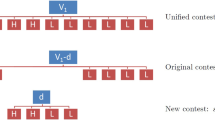Abstract
In this paper, we ask a fundamental design question in the theory of contests: Should contestants and reward money be pooled into a single grand contest, or should they be divided into parallel subcontests? We theoretically explore optimal divisioning using Tullock’s lottery contest framework and compare the performance, i.e., total effort generated, of the grand contest to the performance of contest divisioning based on players’ ability or risk attitude. When all players are risk neutral, contest divisioning is never optimal. However, given that players are heterogeneous in either ability or risk attitude, we find that contest divisioning is optimal when the degrees of absolute risk aversion are sufficiently large. Importantly, our results support the widespread use of divisioning seen in practice.





Similar content being viewed by others
Notes
We summarize the literature using a Tullock-style lottery CSF. Divisioning has received some attention in other settings assuming risk neutral players. See Moldovanu and Sela (2006) for private information all-pay auctions (Moldovanu and Sela 2001) and Fang et al. (2020) and Xiao (2019) for public information all-pay auctions.
Similar existence and uniqueness arguments are applied to any combination of risk and ability heterogeneity discussed below.
References
Albert SM, Duffy J (2012) Differences in risk aversion between young and older adults. Neuroscience and Neuroeconomics 2012(1):3–9
Beviá C, Corchón LC (2015) Centralized vs decentralized contests. Econ Lett 137:32–35
Beviá C, Corchón LC (2015) Relative difference contest success function. Theor Decis 78(3):377–398
Borghans L, Heckman JJ, Golsteyn BHH, Meijers H (2009) Gender differences in risk aversion and ambiguity aversion. J Eur Econ Assoc 7(2–3):649–658
Charness G, Gneezy U (2012) Strong evidence for gender differences in risk taking. J Econom Behav Organiz 83(1):50–58
Chowdhury SM, Kim S-H (2014) A note on multi-winner contest mechanisms. Econ Lett 125(3):357–359
Chowdhury SM, Kim S-H (2017) Small, yet Beautiful: Reconsidering the optimal design of multi-winner contests. Games Econom Behav 104:486–493
Clark DJ, Riis C (1996) A multi-winner nested rent-seeking contest. Public Choice 87(1):177–184
Corchón LC, Serena M (2018) Contest theory. Handb Game theory Ind Organiz 2:125–146
Cornes R, Hartley R (2003) Risk aversion, heterogeneity and contests. Public Choice 117(1–2):1–25
Cornes R, Hartley R (2005) Asymmetric contests with general technologies. Econ Theor 26(4):923–946
Croson R, Gneezy U (2009) Gender differences in preferences. J Econom lit 47(2):448–74
Drugov M, Ryvkin D (2022) Hunting for the discouragement effect in contests. Rev Econ Design. https://doi.org/10.1007/s10058-022-00308-4
Fang D, Noe T, Strack P (2020) Turning up the heat: The discouraging effect of competition in contests. J Polit Econ 128(5):1940–1975
Fu Q, Jingfeng L (2009) The beauty of bigness: On optimal design of multi-winner contests. Games Econom Behav 66(1):146–161
Fu Q, Zenan W (2019) Contests: Theory and topics. Oxford University Press, In Oxford Research Encyclopedia of Economics and Finance
Leuven Edwin, Oosterbeek Hessel, van der Klaauw Bas (2011) “Splitting contests.” Working paper, mimeo
Moldovanu B, Sela A (2001) The optimal allocation of prizes in contests. Amer Econ Rev 91(3):542–558
Moldovanu B, Sela A (2006) Contest architecture. J Econ Theory 126(1):70–96
Ryvkin D (2013) Heterogeneity of players and aggregate effort in contests. J Econ Manag Strategy 22(4):728–743
Tullock G (1980) Efficient rent seeking. In: Buchanan JM, Tollison RD, Tullock G (eds) Toward a Theory of the Rent-Seeking Society. Texas A &M University Press, College Station, pp 97–112
Vojnović M (2015) Contest theory: Incentive mechanisms and ranking methods. Cambridge University Press, Cambridge
Wang X, Zenan W, Zhu Y (2020) Centralized versus decentralized contests with risk-averse players. Econ Lett 186:108816
Wärneryd K (2001) Replicating contests. Econ Lett 71(3):323–327
Xiao J (2019) Ability grouping in all-pay contests. Unpublished paper, Department of Economics, University of Melbourne
Author information
Authors and Affiliations
Corresponding author
Additional information
Publisher's Note
Springer Nature remains neutral with regard to jurisdictional claims in published maps and institutional affiliations.
We thank participants of the \(7^{\text {th}}\) Annual Conference on Contests: Theory and Evidence, two anonymous reviewers, and the Associate Editor for helpful comments.
Rights and permissions
Springer Nature or its licensor holds exclusive rights to this article under a publishing agreement with the author(s) or other rightsholder(s); author self-archiving of the accepted manuscript version of this article is solely governed by the terms of such publishing agreement and applicable law.
Springer Nature or its licensor holds exclusive rights to this article under a publishing agreement with the author(s) or other rightsholder(s); author self-archiving of the accepted manuscript version of this article is solely governed by the terms of such publishing agreement and applicable law.
About this article
Cite this article
Brookins, P., Jindapon, P. Contest divisioning. Rev Econ Design (2022). https://doi.org/10.1007/s10058-022-00311-9
Received:
Accepted:
Published:
DOI: https://doi.org/10.1007/s10058-022-00311-9



